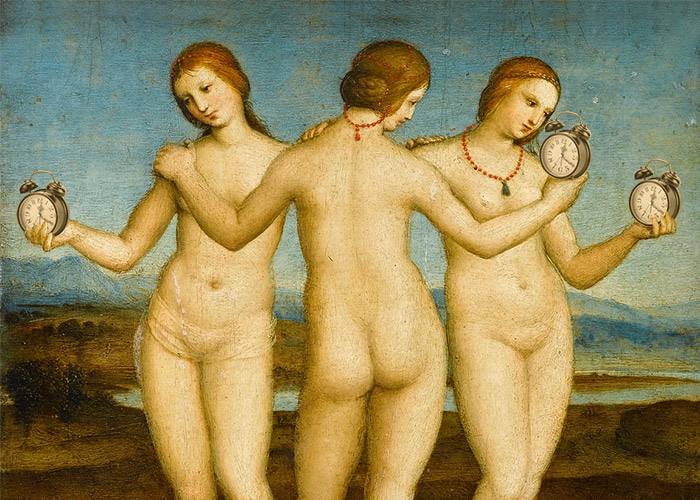
(A tale that lends itself to psychoanalysis)
I. Once Brusnikin had a dream that women were interested in him. All kinds of women: young, mature, funny, pretty ones and even some with long legs and a narrow waist. He woke up almost at the same time as the alarm clock, looked at his wife putting on her robe – she wanted to get to the bathroom before him – and decided not to tell her about the dream. Not that Brusnikin usually told his dreams to his wife – quite the contrary, mostly because he saw them very rarely, a teaspoon a year. She, on the other hand, always told him hers in detail: about a fish that got entangled in the currant bushes, about the flood in the shower, and about how she, just a girl in a red, lace-trimmed dress, was going with Victor to Auntie Evdokia’s dacha. By train, of course, which, for some reason, was half-empty. What a strange thing, his wife said. There was no way Vitya could have known Auntie Evdokiya–the poor woman died three years before I started my studies at the institute where I met him at a party for young students. And she looked to the side questioningly. No, Brusnikin never told his dreams to his wife – although that was one instance where he could have taken full-blooded revenge on her. But he did not.
And here’s our Brusnikin, a middle-aged man, quite unremarkable and a bit bald, driving around town, going to work, and all the women are really interested in him. One gets acquainted with him in the elevator, another – in the subway car, and the third comes with instructions from the adjoining department–and also gets acquainted. And all of them are so serious and so interested in Brusnikin. They set up dates with him and promise to at least feed him. Brusnikin is terrified, he doesn’t know what to do. He was used to going with the tide, which is why he could not refuse any of them, and he took invitations right and left, barely managing to assign them to different days of the week or different hours. He would come home stupefied, tired, and fall asleep. And in his dream Brusnikin saw that women had stopped being interested in him. They called him and canceled their dates, they even called him a sissy, though why should they? But he was not offended at all and, without waking up, he sighed with great relief.
II. Once Brusnikin had a dream that women began to take an interest in him. All kinds of women: young, pretty, very pretty, and even a few with beautiful knees. He did not tell his wife about this dream; it wasn’t necessary.
And so Brusnikin goes to work in the morning, and the women at work flirt with him, and he is happy. He accepts invitations, and puts them in his notebook, so he can get them all. From that day on Brusnikin’s life was fun. Well, his wife once caught him or managed to read his secret notebook and kicked him out, but he was not sad for long, since women were still crazy about him. He started wearing glasses so he could read the small print, and his bald spot was expanding little by little, but they were still coming at him–on the escalator of the metro, in the cinema on the balcony, and as for the adjoining department – let us keep silent about it out of modesty.
However, although Brusnikin himself was not modest, he was not a braggart either. He knew he had a great natural gift and he carried it with dignity. He lived a bachelor’s life, did not make his bed, and could not cook. But he always ate tasty dishes, especially on Fridays and Saturdays, and drank very moderately. And then suddenly he had a dream on a dark autumn night that women had stopped being interested in him. Brusnikin woke up in terror and listened to his heavy and too frequently beating heart until the morning.
III. Once Brusnikin had a dream that women began to take interest in him. All kinds of women: young, mature, very mature. They were coming at him everywhere, on the bus and in the office, and from all the adjoining departments, all the personnel offices, and especially from the administration. Brusnikin did not tell his wife about it, why should she worry? But she was only glad when Brusnikin made a leap up the career ladder, and when the director of the company gave him a triple bonus, and when they started sending cleaning help to his house twice a month for free and renovating his bathroom for next to nothing.
Brusnikin was on the upswing, a real upswing. And soon it turned out that he was no worse than the other members of the expert-technical council, and even better than them – and he was immediately introduced to the board. And when it turned out that his leadership skills were no worse and at least as good as the others, he was given a considerable option and was moved to the vice-president’s chair. And all this time women continued being interested in Brusnikin. And he continued to go up, and, frankly, soon he reached, as they say, considerable heights. There was even talk about the Presidium of the Union of Industrialists – the one that meets annually at a round table you know where and you know with whom. And then Brusnikin suddenly had a dream that women had lost interest in him.
Brusnikin neither cried from happiness nor shuddered with horror. He did not even wake up. He just thought only – well, thank God, how happy my wife will be. After all, it was not easy for her to endure all this – despite the damp cleaning, the plumbing according to the best European standards, and, he wasn’t sure if he should remind her of this, – a mink fur coat they bought at an unprecedented, almost supernatural sale. That is, if there were no cleaning, no fur coat, and no warm floor in the bathroom, it was not even clear whether they would have stayed together as a family. Well, now, thank God, they already had enough money for an imported car and for a tour to Antalya. And the women would finally leave him alone. And the departments, the sixth, the seventh and the tenth were going to be combined anyway since it would be beneficial from several points of view; and a sewing shop would certainly go to Podolsk, where they charge much less per square meter. Why go this far? We would rent a hostel, so the employees could rub elbows with each other – according to the latest research, this is very useful for production. We would bring moms to profitability, sure as eggs. By the way, about a quarter of the promotional package would have to be sold in a week, the market was up, and it was worth it, although it was unlikely to go up any higher. And the branch in Novo-Dokuchaevo had to be broken through, and Zimovkin should be sent there as the head, he was young, active, and eager to fight, so let him get the taste of the real world properly.
Brusnikin turned on the other side and continued sniffing as if nothing had happened. Deeply and evenly – with a calm conscience, as the saying goes.
About a week later he dreamed that women …
Translated from Russian by EastWest Literary Forum

Ilyinsky Pyotr Olegovich was born in St. Petersburg (Leningrad). Since childhood, he was torn between natural sciences and liberal arts. He graduated from Moscow State University, then received a PhD in biology. He completed his post-doctoral studies at Harvard Medical School, and in 2008-2016 he taught at Boston University. His first non-scientific publication came in 1989 in the magazine “XX century and the World”, a harbinger of Russian political reforms. He published several books in Russian: “A change in Colors” (2001), “Carving the Stone” (2002), “A Long Instance of Birth. Meditating on the History of the Ancient Rus” (2004, 2nd ed. 2017), “A Legend of Babylon” (2007), “At the Very Edge of the Forest” (2019). His novel ‘The Era of Enlightenment’ is about to be published in Moscow. Many essays, short stories and verses have been published in various Russian literary journals around the globe. He is a member of St. Petersburg Writers Union.
Launched in 2012, “Four Centuries” is an international electronic magazine of Russian poetry in translation.
“The Lingering Twilight” (“Сумерки”) is Marina Eskin’s fifth book of poems. In Russian.
A collection of moving, often funny vignettes about a childhood spent in the Soviet Union.
“Vivid picture of life behind the Iron Curtain.” —Booklist
“This unique book will serve to promote discussions of freedom.” —School Library Journal
A new collection of poems by Ian Probstein. (In Russian)
Young readers will love this delightful work of children’s verse by poet William Conelly, accompanied by Nadia Kossman’s imaginative, evocative illustrations.
A book of poems by Maria Galina, put together and completed exactly one day before the start of the Russian invasion of Ukraine. This is Galina’s seventh book of poems. With translations by Anna Halberstadt and Ainsley Morse.